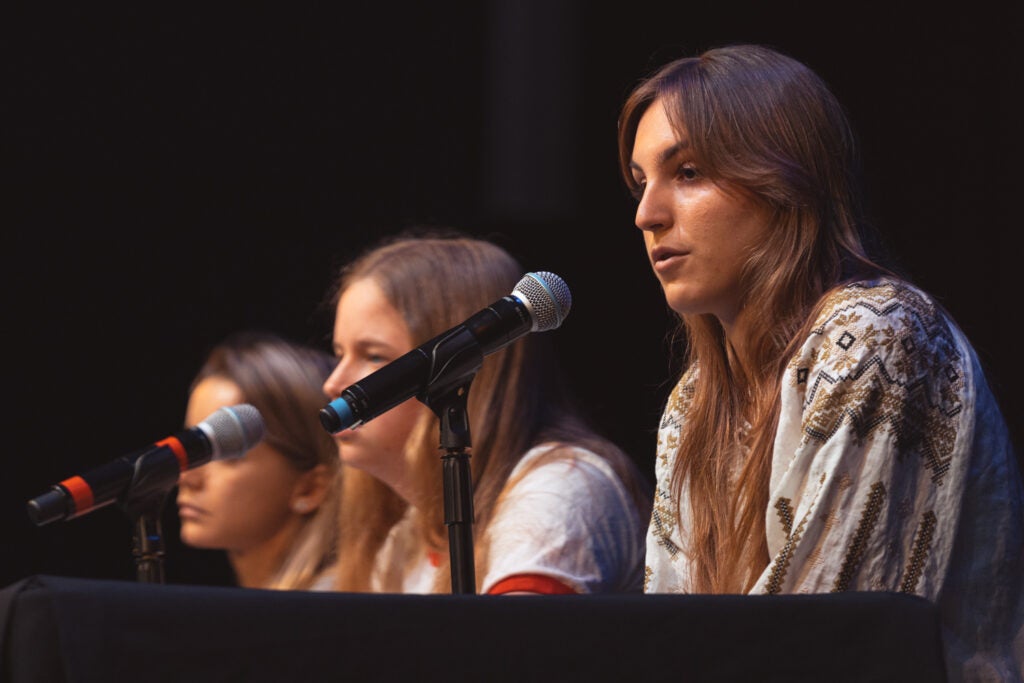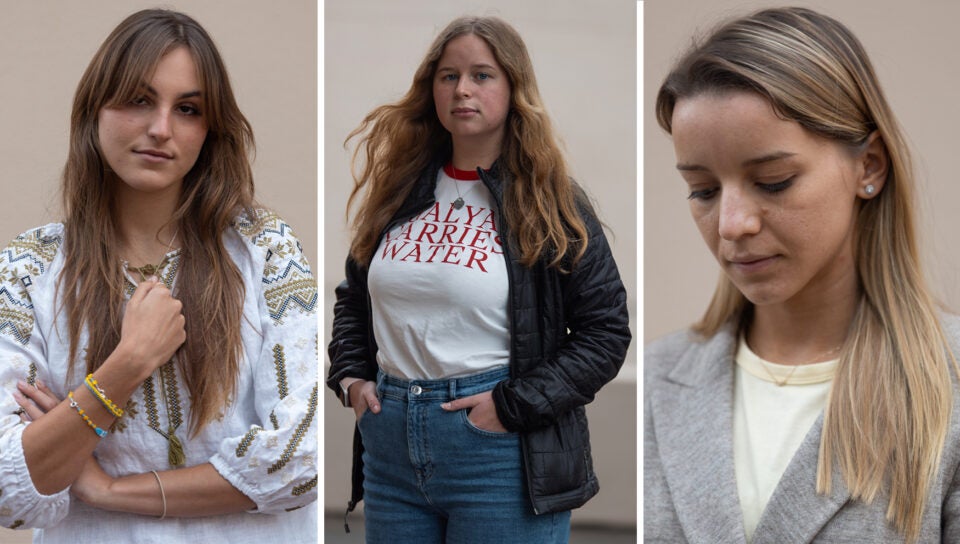‘Time just stopped’: Ukrainian students share their stories
Stanford in Government hosted a conversation with Ukrainian students on the ongoing Russian war in Ukraine on Thursday evening.
Anastasiia Malenko, ’23, felt tunnel vision in class last week as she learned bombs were dropping in her home country of Ukraine.

Ukrainian students Kateryna Sliunkova, ’22, (left), Anastasiia Malenko, ’23, (middle) and Catarina Buchatskiy, ’23, (right) shared their thoughts on the ongoing Russian war in Ukraine from a historical and personal perspective at a Stanford in Government event at Dinkelspiel Auditorium on Thursday. (Image credit: Andrew Brodhead)
She broke down sobbing and called her mother in Ukraine, where it was 5 a.m. Her family quickly gathered all their belongings and moved to hide from the shelling.
“Since that day, my life has not been the same. I haven’t been sleeping all that much. The only thing I can focus on is the volunteer efforts to help Ukraine,” she said. “… I’ve been experiencing very strong cognitive dissonance because life at Stanford just goes on. I mean, the weather is great, the people are great, it’s week nine and people are drowning in work. But for me, time just stopped on Wednesday.”
Malenko joined Ukrainian students Kateryna Sliunkova, ’22 and Catarina Buchatskiy, ’23, Thursday to discuss the ongoing Russian war in Ukraine, at an event hosted by Stanford in Government. Yuliya Ilchuk, assistant professor of Slavic languages and literatures and director of undergraduate studies, Slavic languages and literatures, served as moderator for the event at Dinkelspiel Auditorium.
President Marc Tessier-Lavigne was unable to attend the event due to a prior commitment but provided a statement of solidarity and support.
“The human toll of this unprovoked conflict has been appalling. Many have been wounded or killed, and more than a million people have fled Ukraine. I join you in deep grief at this loss of life and the growing humanitarian crisis,” he wrote in part. “I have also been deeply moved by the courage and determination of the Ukrainian people in their fight to preserve their democracy and national identity. Their resistance has been a source of inspiration for the whole world.”
Fear and pride
Buchatskiy grew up in Kyiv, and her family is from Odessa. She felt desperate as war was declared. “Since then, it’s been a roller coaster of fear, anger, hope and a lot of pride for how long we’re still standing and how long we’ve been able to withstand the attacks,” she said.
Buchatskiy will return to the Ukrainian border on Saturday to help send military supplies to Ukrainian cities. It’s important to provide donations and continue to spread awareness through events such as the one on Thursday, she said.
“Putin’s declaration of war was more than just a declaration of war, or conquest of the territory of Ukraine. It was a challenge to the very existence of Ukrainian people, culture and the Ukrainian nation,” she said. “And so having people speak out and having people have a discussion about the fact that we do have our own national identity, we have our own stories, we have a narrative that isn’t the one that Putin is trying to push on us, is important.”
Sliunkova was born and raised in Dnipro and is now a dual-degree graduate student in the Graduate School of Education and Graduate School of Business. She has felt paralyzed, she said, as she worries about her family members sheltering in their basement when air alarms go off.
“We are horrified, scared and no longer able to keep up with academic assignments or recruitment or anything,” she said. “But after all, it’s not about us. It’s about our country, our friends at home, our families at home. I always try to direct all the intentions and resources towards Ukrainians who suffer now.”
The students noted that the Russian aggression against Ukraine is not new and detailed how their families have been imprisoned and oppressed by Russia for years. Each also spoke of the importance of freedom and sovereignty for Ukraine.
We are used to the Russian state oppression. But we are also used to being resilient in the face of oppression, to shining our light, to showing that our culture is distinct and showing our courage in everyday acts.
—Anastasiia Malenko, ’23
“We are used to the Russian state oppression,” Malenko said. “But we are also used to being resilient in the face of oppression, to shining our light, to showing that our culture is distinct and showing our courage in everyday acts.”
Stanford in Government is a student-service organization that seeks to create a culture of civic and political engagement on the Stanford campus by offering opportunities for students to engage with and pursue policy as public service.
SIG Chair Chase Small, ’23, studies international relations and attended a rally held by Ukrainian students last Friday. He was struck by the bravery, fortitude and resolve of students and their families in such overwhelming circumstances, he said, and he began looking for more ways in which students can stand in solidarity with them.
“What’s happening in Ukraine is incredibly significant for all of us and in particular, our peers who are Ukrainian,” he said. “We wanted to provide a platform for our Ukrainian peers to share what this means for them and their families in a historical lens.”
There are a lot of great events happening on campus focused on the geopolitical, economic and other implications of the crises, he said, but at the end of the day, this is a conflict affecting real people, people at Stanford and close to Stanford. “We wanted to share that to build solidarity across campus.”
Malenko urged those who would like to support Ukraine to visit standwithukraine.how. There will be a rally in White Plaza at 1 p.m. Friday that will include perspectives from Ukrainian students, faculty and others.
“It’s very valuable for the Stanford community to understand how people who go to school with them are impacted,” Malenko said. “And I think it’s very valuable for them to hear what I’m going through and actually find out from me about the ways to help, which there are very many.”
